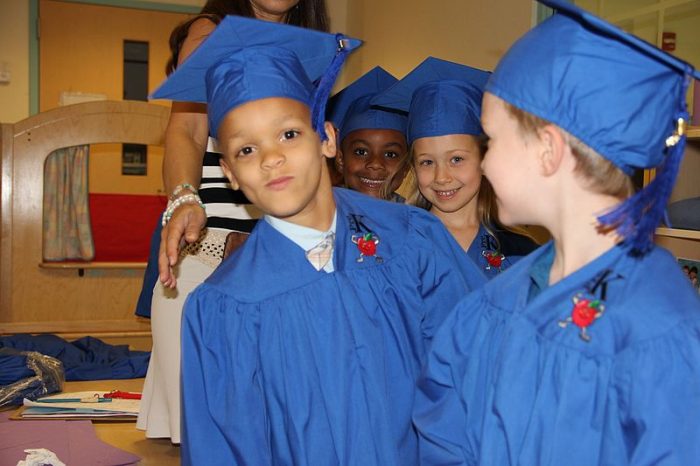Full disclosure: I am an educator—a school person.
I love schools. I love school people. I love little people learning in classrooms full of brightly colored pictures and lots and lots of books. I love challenging questions and engaging debate. I love that ah-ha moment when it just clicks. And I love helping teachers teach better and children learn better.
So, it is sad for me to say our schools are in trouble.
Every time we turn on the news or even check into social media, we see that the world is changing at a pretty frightening pace. We see the ways that technology has already impacted our world—and those changes just keep coming. We see violence in our communities. We see racism, classism, sexism, privilege, and bias in every tweet, every news story, every song lyric, and every social interaction.
Schools are reflections of our communities, but they are more than that: schools are meant to shape the future.
And the future, as it looks right now, needs to be shaped in a very different way.
George S. Counts published Dare the School Build a New Social Order in 1932. In his introduction, he writes:
“As the possibilities in our society begin to dawn upon us, we are all, I think, growing increasingly weary of the brutalities, the stupidities, the hypocrisies, and the gross inanities of contemporary life. We have a haunting feeling that we were born for better things and that the nation itself is falling far short of its powers.”
Those words could have been written today.
Counts goes on to say that “the times are literally crying for a new vision of American destiny” and he suggests that schools are where that new destiny will begin.
While I agree with Counts that schools have considerable power in shaping the future of our world, I would also argue that communities have more power in shaping the future of schools than they are taking.
For decades, we have gone back and forth about who is responsible for student performance on standardized tests, the high school dropout rate, the number of remedial courses required at colleges and universities, the country’s performance compared with others around the world, or the global economy.
We have changed standards and assessments, we have lengthened the school day and provided more professional development to teachers, we have tried charters and vouchers, we have changed leaders and teachers—and our schools continue to lag behind.
According to data collected by the Organisation for Economic Cooperation and Development (OECD), a global organization dedicated to improving the socio-economic standards for people around the world, students in the United States perform significantly lower in Reading, Math, and Science than students around the globe.
The U.S. ranks 36th out of 45 countries in Mathematics and 23rd in both Reading and Science. This data also supports what we know about college and career readiness. Students in the United States are not prepared for college or the workplace; between 40 and 60 percent of American students need remediation in the areas of English or Math (or both) when they get to college.
Before you put down your morning coffee and make the decision to homeschool, just consider everything that schools are expected to manage: ever-shrinking budgets, unfunded mandates, community violence, teacher turnover, socio-economic inequities—schools have tried to adapt to changes in society, but the changes are coming too fast for anyone to keep up with.
The real issue is that the skills that kids will need to be successful humans are the very things that get cut or ignored when we think about improving test scores.
As a parent, as a community member, as an employer, or as a global citizen, we must all be activists when it comes to our schools and the education of our future. So, what are the skills that today’s young people will need if we are to provide them with the tools they need for the future? The answers might surprise you.
The key to making America great again in terms of global competitiveness is the exact opposite of what we see in our highest levels of leadership.
Empathy
The future starts here. We have to help our communities by helping our children and one another see that there is more that connects us than separates us. Empathy is being able to see someone else’s struggle or experience and connect, rather than judge. Empathy is about respecting other humans enough to get to know them and to consider how words, actions, tweets, images, and social media posts make them feel.
Problem-Solving
Solving problems is pretty much what life is about, but the skill set that goes into problem solving requires seeing the desired end result, brainstorming possible solutions, prioritizing solutions based on prior knowledge or new learning, trying, probably failing, and then trying again. This is where having a growth mindset is so important: it is often in the failing forward that we find the best learning or discover the most innovative new idea. Having a growth mindset is very different from always getting the right answer. We have made schools pressure cookers of performance, and kids are afraid to take risks.
Perseverance
Perseverance is the ability to keep on going, even when something is difficult. There is more to perseverance than just saying “winners never quit.” Actually, it’s really not about winning at all—it’s about how we keep going. The ability to persevere, to keep your eye on the prize, takes optimism and the consistency of hard work. It’s important to know how to use resources to keep working through something hard, but there is not always an app for that and Google does not have all of the answers.
Collaboration
Being able to work with other people, even if they have different backgrounds or different beliefs, is necessary in order to see the world differently. Being a part of a team isn’t just about winning—and we have unfortunately sent the message to our kids that if they are not the star of the team or the lead in the show, then they are failing. The future needs people who can use their talents to be of benefit to more than just themselves. And with changes in technology providing opportunities for remote collaboration, we need to be able to communicate with others and honor the contributions of everyone on the team.
Creativity
The world needs creative thinking and creative problem-solving. Kids need it, too. Creativity is so much more than coloring or taking piano lessons: it is developing the possibility of “what if?” Creativity is seeing the world in new and different ways. It is imagination. It is having the time to wonder, to dream, to make things, and to explore. Creativity is seeing the possibilities in the world (and in the people) around us. It is green skies and purple trees, because why not?
Leadership
Believe it or not, leadership skills can be taught and it’s about more than telling others what to do. Leadership is about seeing the big picture and helping to bring out the best in others. When we help children develop skills like empathy, problem-solving, and perseverance, we help support their leadership potential. When we give children opportunities to find solutions to real problems, they begin to see how they fit in the world and how they can be a part of changing the world for the better. Leadership is about serving others and making sure that their work looks good.
No one wants to think that the one-room schoolhouse model still exists in today’s schools, but we are not that far removed.
Teachers are expected to perform miracles with 25 to 30 kids in a class: every student on a different reading level, with a different way of learning, from a different cultural or socio-economic background, and carrying different baggage.
If we are truly preparing the next generation to make America great again, then we must use a different toolbox than the one we have been using.
~







Read 1 comment and reply